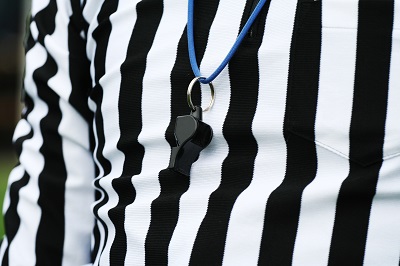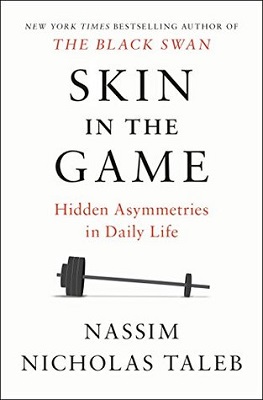Playing the Game of Life to Avoid Losing
By Arnold Kling

Reality doesn’t care about winning arguments; survival is what matters.
—Nassim Nicholas Taleb, Skin in the Game: Hidden Asymmetries in Daily Life (page 13). 1
In his latest book, Skin in the Game, Nassim Taleb offers an approach to social and political philosophy that he believes will encourage socially constructive change and increased freedom.
He starts with “double-negative utilitarianism,” which means to minimize harm. This leads to a focus on the proper management of risk. Taleb argues that only when people are themselves exposed to the adverse consequences of their choices do they take risks that are constructive for society. When they do not have “skin in the game,” they take risks that are harmful and dangerous. This leads Taleb to advocate libertarianism, in which decentralized entrepreneurs are heroes, while those who impose centralized decisions are villains.
The utilitarian double-negative
Taleb favors what he calls the Silver Rule, which is a double-negative formulation of the Golden Rule.
The Golden Rule wants you to Treat others the way you would like them to treat you. The more robust Silver Rule says Do not treat others the way you would not like them to treat you… it tells you to mind your own business and not decide what is “good” for others. We know with much more clarity what is bad than what is good. (page 19)
This extends to society in general. Standard utilitarianism talks of “the greatest good for the greatest number.” The double-negative formulation says to do the least overall harm. It enjoins us to be humble and careful in advocating for social change. Regarding the Silver Rule, Taleb continues,
First, it tells you to mind your own business and not decide what is “good” for others. (page 19)
When a government official decides what is good for you, the official’s decisions have consequences for you but not for the official. This creates one of the asymmetries that Taleb worries about most.
How society learns
“Ruthless evolution, with survival of the fittest ideas and the most prudent risk-takers, is the key”
Taleb believes that society learns and progresses through a process of trial and error. Ruthless evolution, with survival of the fittest ideas and the most prudent risk-takers, is the key.
… people don’t learn so much from their—and other peoples—mistakes; rather, it is the system that learns by selecting those less prone to a certain class of mistakes and eliminating others. (pages 13-14)
Taleb says that we should respect ideas and practices that have survived a long time, even if they seem counterintuitive.
The longer an idea has been around without being falsified, the longer its future life expectancy. (page 148)
Above all, in order to learn, individuals must take risks in which the adverse consequences fall on oneself, not on others.
Taleb adopts a strong form of philosophical pragmatism, in which ideas have merit only if they can be shown to work in practice.
There is no such thing as the “rationality” of a belief, there is rationality of action. (page 215)
Anything that hinders one’s survival at an individual, collective, tribal, or general level is, to me, irrational. (page 219)
Assessing Risk
Taleb argues that in order to assess risk properly, one must account for the possibility of ruinous extreme events and not ignore them just because they are so unlikely. For example, the fact that fewer people die from terrorism or infectious diseases than from accidents is not an argument to take terrorism or infectious diseases lightly.
The probability that the number of people who drown in their bathtubs in the United States doubles next year… is one per several trillions lifetimes of the universe. This cannot be said about the doubling of the number of people killed by terrorism over the same period. (page 231)
Even if bathtub accidents are more prevalent today, the potential for catastrophe coming from Ebola or terrorism is greater than the potential for a mass outbreak of bathtub accidents, because only one incident is needed to wreak a large impact.
The worst people at assessing risk are those without skin in the game. Taleb reserves his greatest scorn for intellectuals who test ideas on others but not on themselves.
It is immoral to be in opposition to the market system and not live (somewhere in Vermont or Northwestern Afghanistan) in a hut or cave isolated from it. (page 183)
The IYI [intellectual yet idiot] has been wrong, historically, about Stalinism, Maoism, GMOs, Iraq, Libya, Syria, lobotomies, urban planning, low carbohydrate diets, gym machines, behaviorism, trans-fats, Freudianism, portfolio theory, linear regression, HFCS (High-Fructose Corn Syrup), Gaussianism, Salafism, dynamic stochastic equilibrium modeling, housing projects, marathon running, selfish genes, election-forecasting models, Bernie Madoff (pre-blowup), and p-values. But he is still convinced that his current position is right. (page 124)
He might have included eugenics in this list.2
The meaning of freedom
Taleb believes that individuals require a great deal of autonomy in order to be truly free. In this view, working in large corporations or other hierarchical environments is antithetical to freedom.
Someone who has been employed for a while is giving you strong evidence of submission… going through years depriving himself of his personal freedom for nine hours every day… He is an obedient, housebroken dog. (page 97)
Freedom is always associated with risk taking, whether it leads to it or comes from it. You take risks, you feel part of history. And risk takers take risks because it is in their nature to be wild animals. (page 104)
You can define a free person precisely as someone whose fate is not centrally or directly dependent on peer assessment. (page 144)
For a related interview with Nassim Nicholas Taleb, see the EconTalk podcast episode Nassim Nicholas Taleb on Rationality, Risk, and Skin in the Game. For additional related material, see also “Jeremy Bentham’s Mistaken Universalism”, by Pedro Schwartz, Library of Economics and Liberty, June 1, 2015; and the EconTalk podcast episode Richard Fisher on Too Big to Fail and the Fed.
Taleb sees freedom as succeeding on your own terms. Trying to impress others or to conform to corporate expectations is “evidence of submission.”
For society as whole, he argues, freedom and progress both depend on decentralization, which realigns decision-making with responsibility. Sooner or later, we have to break free of central authority and dissolve those institutions that allow individuals to take risks while imposing their costs on others.
… we have no choice but to decentralize or, more politely, to localize; to have fewer of these immune decision makers… if we do not decentralize and distribute responsibility, it will happen by itself, the hard way; a system that doesn’t have a mechanism of skin in the game, with a buildup of imbalances, will eventually blow up and self-repair that way. If it survives. (pages 11-12)
Think of the “imbalances” that built up at “too big to fail” financial institutions leading to the crisis of 2008. Governments dealt with this by expanding deficits and enlarging the balance sheets of central banks. This created new imbalances, with risks transferred to future taxpayers, perhaps setting the stage for a worse crisis at some later date.
Skin in the Game makes a strong case for liberty, based on double-negative utilitarianism in the presence of risk. Taleb argues against centralization that gives officials the power to impose risks without consequences for themselves. With his strong philosophical pragmatism, he sees intellectuals and philosophers as particularly dangerous. Ironically, Taleb’s book represents an intellectual contribution to political philosophy.
Skin in the Game: Hidden Asymmetries in Daily Life, by Nassim Nicholas Taleb. Available on Amazon.com.
See “Dismal Race ‘Scientists’,” by Arnold Kling. Library of Economics and Liberty, May 2, 2016.
*Arnold Kling has a Ph.D. in economics from the Massachusetts Institute of Technology. He is the author of several books, including Crisis of Abundance: Rethinking How We Pay for Health Care; Invisible Wealth: The Hidden Story of How Markets Work; Unchecked and Unbalanced: How the Discrepancy Between Knowledge and Power Caused the Financial Crisis and Threatens Democracy; and Specialization and Trade: A Re-introduction to Economics. He contributed to EconLog from January 2003 through August 2012.
Read more of what Arnold Kling’s been reading. For more book reviews and articles by Arnold Kling, see the Archive.

